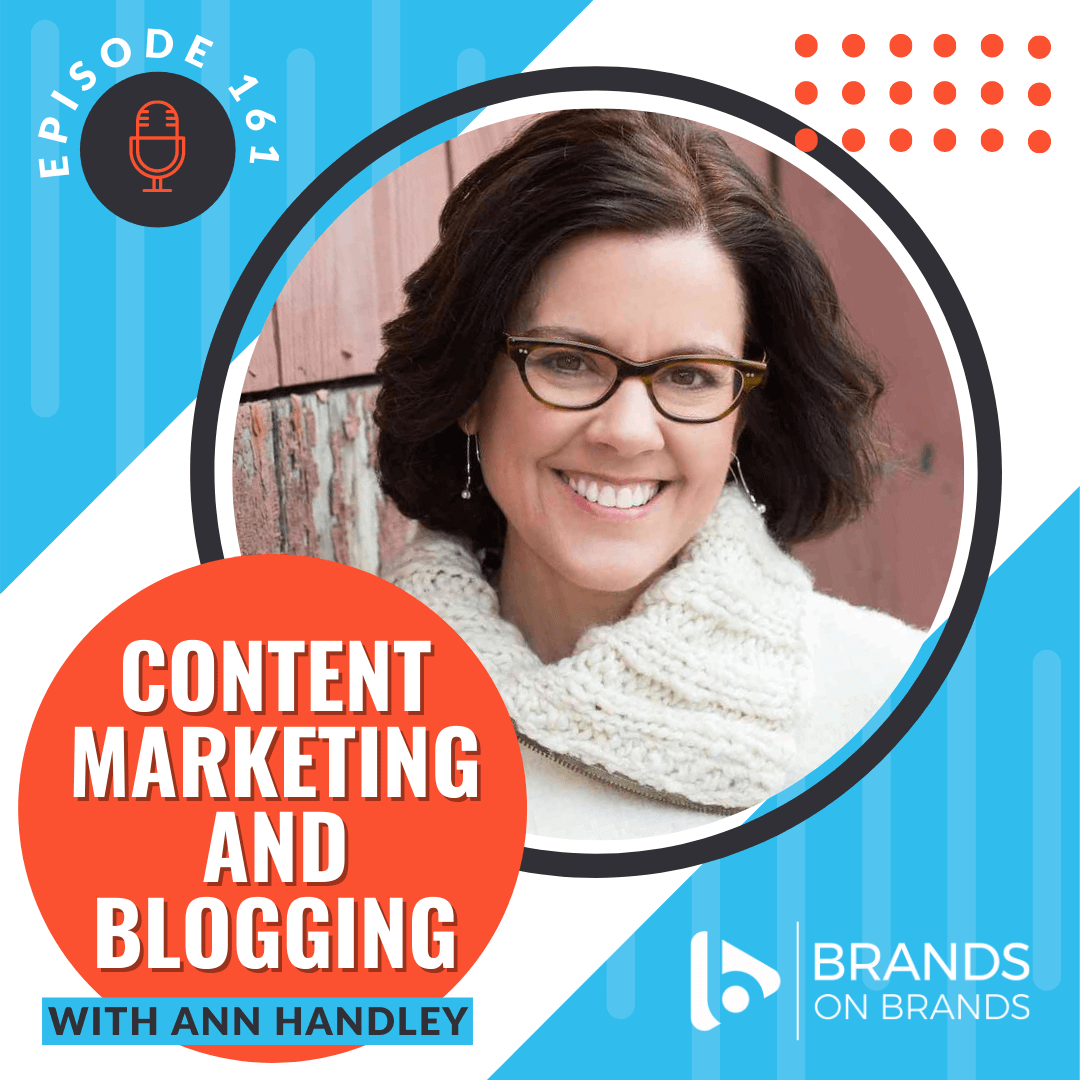Today’s topic is a deep dive into content creation, content marketing, blogging, and why it matters. I discuss these topics with the amazing Ann Handley.
She has great tips for content marketing, and we also get into her personal journey going from creating content for her company and other people to also creating content for her personal brand and building a community around her ideas.
You don’t often get to see someone who’s been in the limelight that long share how they switched, what they did, and how they think about creating content for their personal brands.
Ann is a Wall Street Journal bestselling author who speaks worldwide about how businesses can escape marketing mediocrity to ignite tangible results. IBM named her one of the seven people shaping modern marketing.
Ann is a digital marketing pioneer and the Chief Content Officer of MarketingProfs, the leading marketing training company with more than 600,000 subscribers.
She is the Wall Street Journal bestselling author of Everybody Writes: Your Go-To Guide to Creating Ridiculously Good Content, and co-author of Content Rules: How to Create Killer Blogs, Podcasts, Videos, Ebooks, Webinars (and More) That Engage Customers and Ignite Your Business. Her books have been translated into 19 languages, including Turkish, Korean, Italian, Chinese, and Japanese.
WHAT IS CONTENT MARKETING AND WHY IT MATTERS
Brandon Birkmeyer: Today we get to talk about one of my favorite marketing topics, which is content marketing, especially around the field of personal branding. Your background speaks for itself in that space.
It seems more people than ever are getting comfortable creating content, which is exciting. I’d love to set the stage here in terms of the value of creating content. Why does it matter?
Ann Handley: It’s funny, I don’t even think about content as being separate from marketing necessarily. Think about everything that you do online. That’s content, whether you are on Twitter, whether you are on Instagram, (where you and I met,) whether you are writing a blog post or emailing your list it, all of that is content.
CREATING CONTENT IS THE SAME AS MARKETING
I don’t think of it necessarily as two separate things. How do you use content in your marketing? Your content is literally your marketing.
The first thing is just to shift your mindset and think about everything that you do as an opportunity to tell your story, brand yourself, let people know what value you can offer them, and grow your own business. That’s the value of content.
Brandon Birkmeyer: What makes it good, especially good for your business? What defines good content versus just content that is cluttering things up?
Ann Handley: I don’t think it’s very complicated. I think good content is what meets the needs of your audience. What has value for them? Think about what you do as a business. Think about what is it that you do for others in that business. That’s the sweet spot of your content.

I think the biggest mistake that so many companies and so many people make is to think only about themselves. I get it because we get excited about our products and our services. We get excited about what we do so we tend to just talk about that.
However, your customers, your prospects, your audience do not care about that. What they care about is what that does for them, what that means for them. If you can focus on what value can I bring to others, that’s really the start of great content.
RELATED: Build your personal brand with the Content Marketing Starter Guide.
YOUR CONTENT MARKETING CAN BE SOMETHING YOU LOVE
By the way, I don’t think that people should also overthink a second thing, because you said something when you were teeing up this question about how creating content is hard. I don’t think that that’s the way you want to go into it.
This conversation we’re having now is content. You’re going to publish it as an audio file. You’re going to publish it as a podcast. You may pick out something and put it on Instagram. You may pick out a piece and put it on LinkedIn, however it is that you’re distributing it.
All of those touchpoints, all of those atomized bits of content is content. I don’t think this conversation is hard necessarily. At least it’s not for me. Maybe it’s torture and really difficult for you. You don’t seem that way, but it could be.
I think that’s what you need to think about. What can I do that I love doing? Maybe it is just having a conversation with somebody and you can make that the cornerstone of your own content strategy.
WHAT PLATFORMS TO CHOOSE FOR CONTENT MARKETING
Brandon Birkmeyer: I think for a lot of people that it’s intimidating because either they don’t know where to start, or they don’t know which format to pick. I tried them all after 18 years in the corporate world of not creating content other than PowerPoint presentations for CMOs.
When I had to do it for myself, suddenly it’s intimidating because there’s a world of ideas in my brain. Trying to figure out which format and what idea to talk about can freeze you a little bit. I just had to take the plunge and start.
Why do you think it’s difficult for people and how can they get past that?
Ann Handley: I think you just articulated it beautifully in the sense that we don’t know where to start. Sometimes when your choices are limitless, that in and of itself is limiting. You think, oh, I could do a podcast. Maybe I should do a blog, or maybe I should start a video channel. I look good on video. All these things that go on in your head.
DON’T GIVE YOURSELF UNLIMITED OPTIONS
I think the important thing, especially for solopreneurs, for individuals looking to build their personal brand, looking to tell their story and appeal to an audience, I think the most important thing is don’t be limitless in how you’re thinking about things.

Pick one thing, one channel; pick the thing that you love to do the most because (we’ll get to this in a minute,) you’re going to need to do it for a while. Choose what you love to do and do it ridiculously well. It’s as simple as that.
My friend, Jay Baer, (this is in my first book) says that no good content is created at bayonet point. In other words, if you’re forcing yourself to create content, to sit down and do it, it’s not going to be very good.
What’s going to happen after a while is you’re going to find reasons to not do it. You’re going to think, “Oh God, not that again. What’s the point? It’s not getting the traction I want it to do.” You’ll tell yourself all of these lies, and you’ll make up all these small excuses until finally you just abandoned it altogether.
START SOMEWHERE WITH YOUR CONTENT MARKETING PLAN
I think that’s the importance of just finding one thing you love to do, number one. Secondly, make sure that you commit to a schedule that you do it consistently. Why do I think that’s important? Because I think it’s as you said, you don’t know where to start. You’ve got to start somewhere. You may feel like you’re not sure if this is the right place to start.
However, one of the things that I realized after doing this for as long as I have, it almost doesn’t matter because you always end up where you need to be.
I’ll give you a really specific example. I have been a content creator, I guess before we even called it that. I started out as a writer. My background is as a journalist. Then when the internet happened, I started publishing online.
I’ve been creating content almost since the Internet’s inception really, which is crazy to think about. In dog years, I think that’s like 1,075 years or something like that.
CONTENT MARKETING WILL EVOLVE WITH YOUR JOURNEY
Eighteen years ago I started working at MarketingProfs. I joined the founder as a principal and became their chief content officer; I created content there for the brand, launching the newsletter, and doing lots of things to build the audience there.
Fast forward to just a couple of years ago. I realized that while I was still involved in content, I wasn’t doing anything that was myself, that was just mine; I wasn’t doing anything to build my own brand.

I wasn’t doing anything to connect with an audience in all the ways that we’re talking about here, something that I own, something that I’m doing consistently. I decided (three years ago this week actually,) that I would launch an email newsletter. I did that under Ann Handley, not under MarketingProfs.
I did it because I wanted a piece of content that I would own. I also wanted secondarily to see what is it like to build an audience? What does it like to connect with people? What is it like to use a vehicle like an email newsletter to extend your personal brand and to build your personal brand?
I wanted to figure out how do I do that? I chose an email newsletter by the way, as opposed to a podcast, as opposed to like a video show. You mentioned that you bounced around a little bit until you figured out what worked for you.
DO WHAT MAKES YOU COMFORTABLE
The reason why I went with the email newsletter is that I’m a writer. That’s the way that I feel most comfortable. That’s what brings me joy. It’s also something that everybody does. I felt like I could do it myself; I wasn’t going to have to get a producer and I wasn’t going to have to buy special equipment. All I needed was myself and my laptop to do it.
Just for simplicity’s sake and for streamlining, that’s why I decided to go with an email newsletter above anything else. All that is just a way to say that I’ve been publishing my own email newsletter every two weeks. It’s not weekly and it’s not daily; it’s every two weeks, every fortnight, if you will, for the past three years.
When I started it, I thought, what am I doing? I really don’t have anything to say, to get back to your comments.
CREATING A CONTENT MARKETING PLATFORM YOU OWN
Brandon Birkmeyer: That surprises me. I was going to say, don’t you think you have an advantage because you’ve been someone who’s been writing and editing for so long?

Even when you said that you didn’t feel like you had your own voice surprised me too because you were the face of a lot of these brands. You were on stages and writing books and it felt like you’re the last person that would say “I wasn’t sure my voice was coming through,” to paraphrase.
What made you feel like your voice wasn’t coming out? Was it a moment?
Ann Handley: Yeah. Just to clarify, I felt like I was getting my voice out there, but not in a way that was building an audience consistently and an audience, by the way, that I owned. That’s the clarification that I wanted to make.
Yes, I was doing a lot of speaking. I was doing books. I had written two books by that point and I was creating lots of content.
YOU WANT TO BUILD YOUR OWN AUDIENCE
Yet I wasn’t building an audience. However it is that you want to think about it, it wasn’t building fans. I didn’t have a community around me. I had these pockets of activity, of flurry, but there was nothing that I truly owned.
Obviously, I own accounts on social media, but I don’t really own those. I felt like I needed something that I could own.
I think that’s the benefit for so many people who are here today listening. You’ve got to think about what it is that I can create that will give me a community and attract people to me that I can have a relationship with, and that feels like something that I own.
CONNECT WITH ANN HANDLEY
Websites:
Instagram: @annhandley
Twitter: @annhandley
MORE ADVICE AND INTERVIEWS
If you’d like more content about how to build your personal brand, check out my free Content Marketing Starter Guide.
And here are some more of my most popular thought leader interviews!
- What Business to Start with John Lee Dumas
- Personal Branding Masterclass with Chris Ducker
- Built to Serve with Evan Carmichael
Don’t want to miss the next thought leader interview? Subscribe to the free B-team Insider Newsletter! And don’t forget to leave a rating and review on iTunes.
Talk soon!
